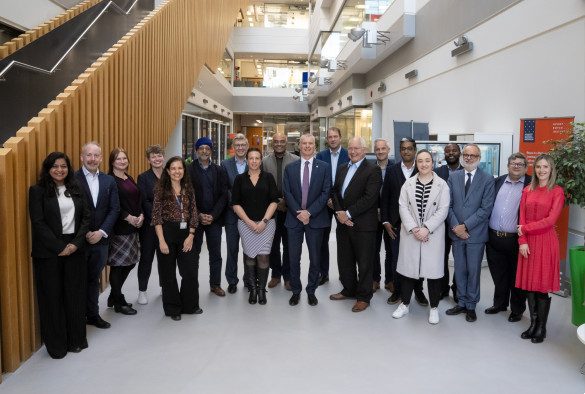The University of Liverpool has signed a Memorandum of Understanding (MoU) with Roche Diagnostics UK and Ireland to advance research and innovation for improved health and community prosperity.
The University is committed to addressing local health inequalities while tackling global health challenges. Through cutting-edge commercialisation and partnerships, it seeks to improve health outcomes for all, aligning closely with Roche Diagnostics' mission of doing now, what patients need next.
The two organisations share a longstanding history of collaboration spanning decades, working in key areas in which the University has significant research excellence, including Biomarkers, Population Health, Automation and Digital Health.
An example is Professor Sarah Coupland, Lead of the Liverpool Ocular Oncology Research Group, who has worked with Roche for the past five years, via an InnovateUK digital pathology project involving six northern universities, developing algorithms for morphological interpretation. Together, they are building a unique national Digital Bioresource for rare eye tumours, which will link with other supraregional eye cancer centres in the UK, allowing for data mining, to improve earlier detection and ultimate improved treatment of these malignancies.
This partnership is part of a broader effort, working closely with the NHS, and the Liverpool City Region Combined Authority (LCRCA), to maximise the potential of the LCR Health and Life Science Investment Zone.
Under the MoU, the University and Roche Diagnostics UK and Ireland will further expand interactions across various research disciplines and strategic innovation priorities, exploring opportunities to support the region's economic development strategy and ambitions through joint projects, centres, programmes, and workforce development.

One exciting future initiative is a collaboration between Roche Diagnostics and the University's Civic Health Innovation Labs (CHIL) to launch the world's first design studio dedicated to maximising the value of real-world diagnostic solutions to population health.
Their shared purpose is to: 'Together, with the healthcare ecosystem, continue to extend the boundaries of science, making data and biotech work for the community's health and prosperity, to improve lives for all.'
Professor Tim Jones, Vice-Chancellor of the University of Liverpool, said: "I'm delighted to formalise our partnership with Roche Diagnostics UK and Ireland, as our shared values make this collaboration particularly meaningful. Together with regional stakeholders, we are establishing Liverpool as a hub of health innovation that attracts investment and talent. This goes beyond improving healthcare; it aims to ensure our city thrives with healthier, more prosperous communities at its core."
Professor Iain Buchan, Director of CHIL, said: "We are delighted to be partnering with Roche Diagnostics UK and Ireland, to find new ways to diagnose conditions sooner, when treatment outcomes are better. We will work with patients and healthcare professions to find better ways of using NHS data to coordinate earlier testing and support follow-on actions after test results - focusing on the most vulnerable patients who often have the poorest access to tests."
Chris Hudson, Director of Access and Innovation at Roche Diagnostics UK and Ireland, said: "This MoU marks a significant milestone in advancing life-saving research, fostering ground-breaking innovation, and delivering real-world solutions. It reflects our dedication to excellence and our vision for a future where our combined strengths create lasting change. We are excited to deepen our already strong relationship with the University of Liverpool and look forward to the numerous achievements and advancements this partnership will bring."
The MoU was signed during a celebratory event at the Materials Innovation Factory (MIF) attended by colleagues from across the University, Roche Diagnostics, LCRCA, Science and Technology Facilities Council, and the Department of Business and Trade.
The University of Liverpool's Research Partnerships Team supported the formation of this partnership. To find out more, please visit this webpage.






